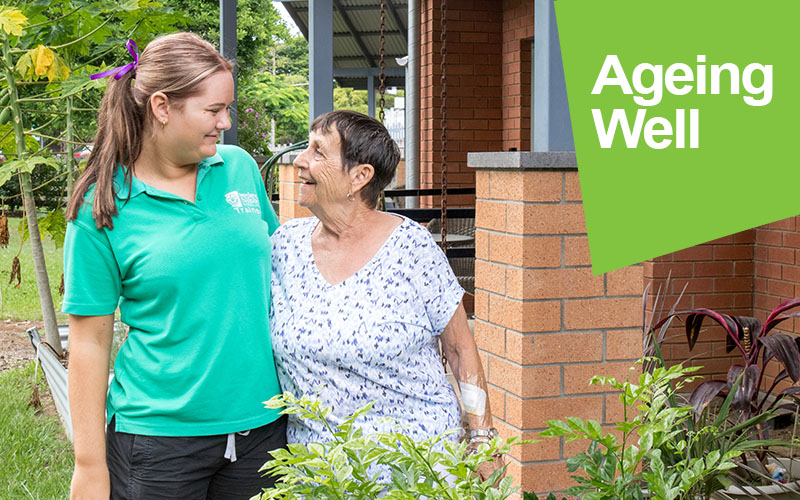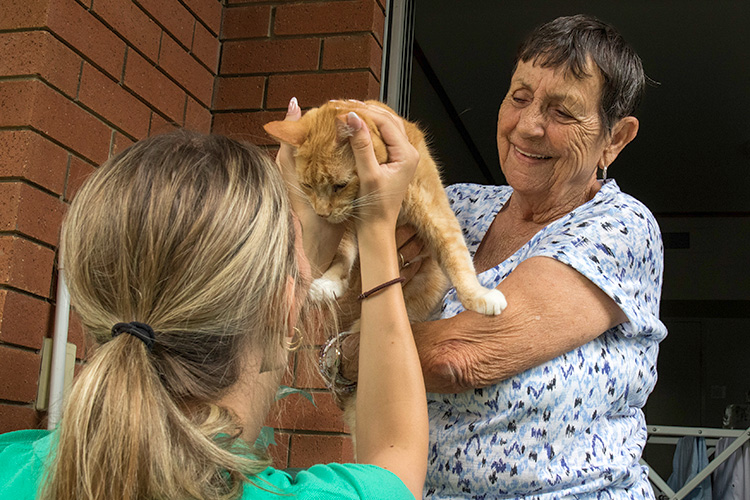9 tips to start the conversation about aged care homes

If you've noticed signs that your loved one needs around-the-clock care, it might be time to start a discussion about residential aged care.
Raising this topic can be emotional and challenging, however, actively listening to their concerns and following the tips our team and residents share below, often eases worries and anxiety.
It's important to note that this conversation may not be resolved in one go. Be patient and open to revisiting the topic as needed. Changes in health or circumstances may prompt new discussions, and ongoing communication is essential.
Moving into an aged care home may initially feel like a loss – of home, independence, and familiar surroundings. However reassurance and understanding can help your loved one feel supported.
– Monique Zipf, Leisure and Lifestyle Coordinator, Cooper House and St Marks Aged Care Communities.
Download Tips to Start the Conversation (PDF 232KB)
9 tips to help you navigate the discussion about residential aged care
Choose the right place and time
Opt for a familiar setting that’s quiet to avoid distractions. Choose a moment when emotions are calm and there's enough time for a thorough discussion.
Do your research beforehand
Gather information about residential aged care options, understand the types of facilities available, services provided, and associated costs. This will allow you to answer questions and address concerns more confidently.
Access to comprehensive information can also alleviate worries and empower them to make informed decisions.
- Monique Zipd, Leisure and Lifestyle Coordinator, Cooper House and St Marks Aged Care Communities.
Call our care team on 1800 448 448 and we can help you with any questions.
Approach the conversation from a place of love and concern
Share specific instances that have led you to consider residential aged care.
- Have you noticed a gradual change in care needs?
- Has there been a significant event, such as a fall or hospital admission?
- Emphasise that the primary goal is to ensure their safety and wellbeing.
I explained to mum the wonderful companionship that may arise. I also mentioned we would make her room suit her personality and a place that would accept Candy cat.
- Nikki, daughter of Sylvia, a resident at Anam Care Aged Care Community. Read Sylvia and Nikki’s full story.

Approach the matter as planning for the future, rather than an immediate action
Explain that their care needs will increase over time, so planning now can avoid issues in the future. This approach can help break initial barriers.
We are seeing an increasing number of applications due to hospital admission and unable to return home. With high demand for residential aged care, planning now can prevent stress when a last minute emergency admission is absolutely necessary.
- Deb Drummond, our Residential Aged Care Admissions Team Leader.
Listen ACTIVELY – what are their specific concerns?
Active listening is crucial. Encourage them to share their thoughts and feelings, and express their concerns and desires without interruption.
Allowing them to freely express their preferences and concerns honours their autonomy and dignity, and helps build trust - easing the transition for everyone.
- Monique Zipf, Leisure and Lifestyle Coordinator, Cooper House and St Marks Aged Care Communities.
Set your own expectations and acknowledge emotions
The discussion may evoke strong emotions. Be prepared for a range of reactions, from sadness and fear to relief or acceptance. Validate these emotions and assure your loved one that their feelings are heard and respected.
Provide reassurance about the future
Address any concerns or fears they might have of moving away from home and their loved ones.
- Are they concerned they will no longer be part of the family?
- Do they fear they will be forgotten?
Reassure them that the decision is made out of love and what it means to everyone once they move out.
Involve someone they trust, if appropriate
This might be their close friend or a family member who they have a strong connection with. This may help your loved one understand why you are discussing residential aged care when they feel they can stay in their home safely and responsibly.
If they still refuse to talk about moving into an aged care home
Moving into residential aged care represents a significant lifestyle change for many individuals. If your loved one is hesitant to discuss this, it's advisable to revisit the conversation at a later time
- Monique Zipf, Leisure and Lifestyle Coordinator, Cooper House and St Marks Aged Care Communities.
- Be patient and revisit the conversation when an opportunity arises.
- Research residential aged care yourself, even if your loved one is not ready, and gather relevant information early. When they are ready, you will have information and options on hand.
Hubert is a 96 year retired engineer whom did not want to come into care at all! His life completely turned around in the last few months living at Anam Cara. He has become one of our ambassadors, he is the glue that holds our Shevaun community together and he is full of ideas with his hand made creations scattered throughout Anam Cara!
– Silvia Holl, Manager at Anam Cara Aged Care Community.
Download Tips to Start the Conversation (PDF 232KB)
Ageing well with WMQ
Our compassionate approach is what makes us extra special!
Experienced aged care at home and in our facilities. Compassionate, respectful, and cherished moments for your loved ones.